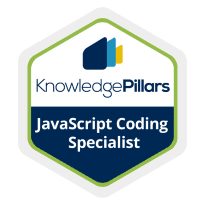Program with JavaScript Operators, Methods, and Keywords
Complete or debug code that uses assignment and arithmetic operators
- assignment
- increment
- decrement
- addition
- subtraction
- division
- multiplication
- modulus
- compound assignment operators
Apply JavaScript best practices
- comments
- indentations
- naming conventions
- noscript
- constants
- reserved keywords
- debugger keyword
- setting breakpoints
- console.log
Evaluate the use of inline and external scripts
- when to use, how to use, and what happens when both are used
Implement exception handling
Complete and debug code that interacts with the Browser Object Model (BOM)
- manage state
- display dialogs
- determine screen size
Program with Variables, Data Types, and Functions
Declare and use variables of primitive data types
- number
- boolean
- string
- null
- undefined
- typeof operator
- type checking functions
- use strict
- converting between data types
- formatting numbers
- string operations
- single quote vs double quote (nesting)
- initialization
Declare and use arrays
- single-dimensional arrays
- multi-dimensional arrays
- iteration
- initialization
- define an array
- sort and search an array
- use push, pop, shift, and unshift methods
- use the length property
- access an array element
Complete and debug code that uses objects
- properties
- methods
- instantiation
- date object
- retrieve date and time parts
- localize date format (MM/DD vs DD/MM)
- add and subtract dates
Complete and debug code that uses built-in Math functions
- random
- round
- abs
- floor
- ceiling
- min
- max
- pow
- sqrt
Complete and debug a function that accepts parameters and returns a value
- reusable code
- local versus global scope
- redefine variables
- pass parameters
- value versus reference
- return values
Implement and Analyze Decisions and Loops
Evaluate expressions that use logical and comparison operators
Complete and debug decision statements
Complete and debug loops
Interact with the Document Object Model
Identify and construct the Document Object Model (DOM) tree
- window
- document
- body
- other HTML elements
Identify and handle HTML events
- onchange
- onmouseover
- onload
- onclick
- onmouseout
- onkeydown
Complete and debug code that outputs to an HTML document
Complete and debug code that locates, modifies, and adds HTML elements and attributes
- get ElementByld
- ge tElements ByTag Name
- get Elements By ClassName
- set Attribute
- create Element
Interact with HTML Forms
Complete and debug code that retrieves input from forms and sets form field values
- retrieve form values
- identify the DOM path
- get values from different types of elements
- prepopulate values
- mask values
Complete and debug code that performs input validation
- case
- string comparisons
- Not-A-Number (NaN)
Describe the form submission process
- onsubmit
- post versus get
- potential targets for submission






